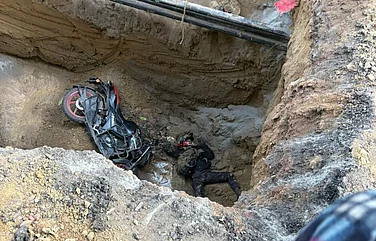IT was stock-taking time for the BJP after its short stint at the Centre, and one eye was clearly on possible mid-term polls. At its national executive meeting from June 21 to 23, party chief L.K. Advani told cadres: "BJP units must remain alert to the possibility of the 12th general elections taking place much earlier, most probably in 1997 itself.... The nation wants to see Atal Behari Vajpayee as prime minister again for a full term."
Leaders pondered over the party's shortcomings in the recent elections, mainly in the South where it won six of the 132 Lok Sabha seats, and also in the East and Northeast, where its performance was abysmal.
At the meet, most members acknowledged the need to work full-scale for a broader social base—even adopt the agitational voice of the CPI(M-L)—but made it clear that the party would always take care not to stray out of the constitutional ambit.
During the course of the debate, several leaders agreed that the BJP should identify tribal and economically-backward regions and work for 'social justice'—the militant CPI(M-L)'s main plank—the only difference being that the saffron front has 'social unity' as a parallel goal.
The national executive, which devoted much of its time to a state wise analysis of the poll results, said the party did not perform as expected in Rajasthan, Andhra Pradesh and Karnataka. But it agreed that the South, East and North-east needed special attention. With little hope of making direct forays into these lost territories, the national executive is more in favour of finding allies. The party's organisational strength is "weak" in these areas except in Assam and Orissa—but even in these two states, the 17 per cent vote-share did not translate into seats. (It won one in Assam, but drew a blank in Orissa.)
In fact, the party's success was concentrated only in six states—Maharashtra, Gujarat, Madhya Pradesh, Rajasthan, Uttar Pradesh and Bihar. Together, they contributed 143 of the 161 seats the party won in the Lok Sabha elections.
For the party, the good news is that it fared well in the constituencies reserved for Scheduled Castes and Scheduled Tribes, till now the Congress' vote-bank. Hence, the national executive marked out these areas for broadening the party base.
Next on the agenda was the "indiscipline" in Gujarat, a discussion which led to many heated exchanges. Advani emphasised that besides unity, the party should restore discipline at all levels. Many felt this was a warning to senior Gujarat leaders that if they do not behave, the party leadership might even sacrifice its own state government to project its "disciplined" face nationwide.
With elections coming up in Uttar Pradesh, the party has to sort out its Gujarat mess. And the party's well-below-expectations performance in Rajas-than has only strengthened the leadership's argument—the Jats did not support the BJP, one of the factors responsible for its poor tally. "I take responsibility for the setback. But rebel candidates damaged our prospects," said Rajasthan Chief Minister Bhairon Singh Shekhawat.
Uttar Pradesh leaders are a trifle worried—Jats still dominate western UP politics. Former state chief minister Kalyan Singh, however, is confident of winning: "We led in 240 assembly segments and were second in another 120 segments of the total 425 in the recent Lok Sabha elections. So there should not be any problem." He also said the BJP would not tie up with any other party for the assembly elections.
The introspection apart, the BJP said it would launch agitational programmes, taking on the United Front and the Congress on corruption issues. The party believes that the Congress support to the UF Government had been procured at a "heavy price—the price being as much immunity and protection as the executive can offer in so far as the corruption of the Rao government is concerned".
The party has to do a lot of homework at the grassroots level—for instance, decide how to bestow greater responsibilities to backwards and Dalits—and much of its success would, of course, depend largely on the failure of the UF Government. But if Deve Gowda delivers in other areas the way he has come out against Narasimha Rao on corruption cases, it would see BJP optimism waver even if there is an early poll. To come out trumps, the party will have to depend on its own positive programmes, not on the United Front's failure.


























